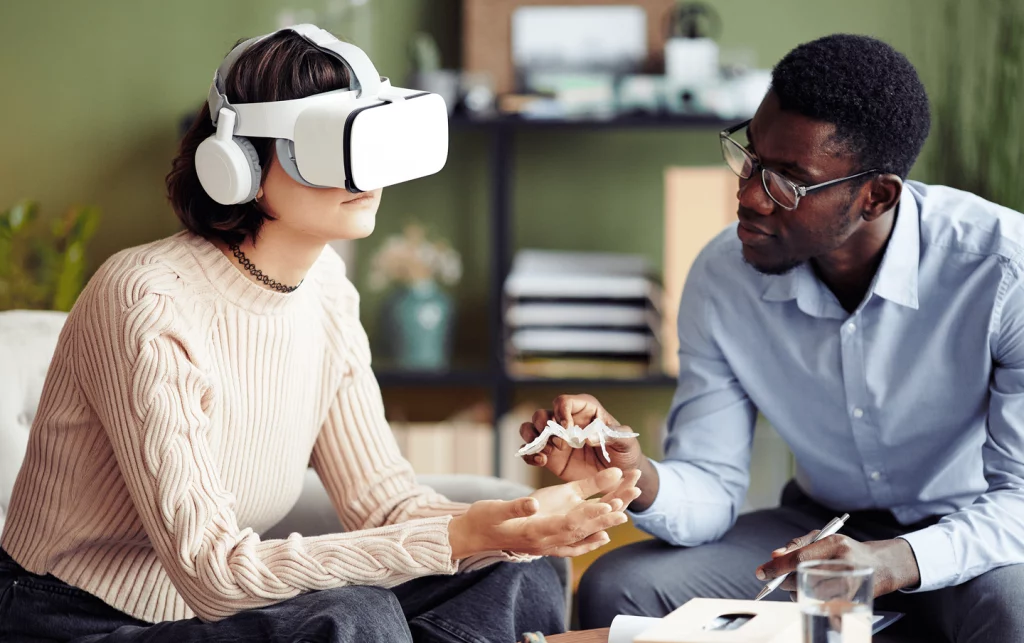The therapeutic landscape is undergoing a quiet yet profound transformation, driven by technologies once confined to gaming arcades and science fiction. Virtual reality (VR), with its immersive, multisensory environments, is becoming a powerful tool for emotional healing—particularly in the treatment of phobias, anxiety, and post-traumatic stress disorder (PTSD). As psychological science and digital innovation converge, therapists and developers are leveraging the capabilities of VR to create safe, controlled spaces where individuals can confront and process traumatic experiences without the risks of real-world exposure. But this revolution is not merely technological; it is deeply human, reshaping how we understand trauma, healing, and the mind’s ability to rewire itself through virtual immersion.
The Science Behind VR and Emotional Exposure
At its core, VR therapy applies the principles of exposure therapy, a long-standing psychological technique for treating anxiety disorders and phobias. Traditional exposure therapy involves gradually and repeatedly confronting a feared object, thought, or situation in a controlled setting until the fear response diminishes. However, many patients find this process overwhelming or impractical. For example, someone afraid of flying can’t feasibly book multiple plane tickets just for exposure; someone with PTSD from a war zone may not be able to re-enter that context safely. VR bridges that gap.
Using a headset, individuals can be immersed in hyper-realistic simulations tailored to their specific fears—such as boarding an airplane, crossing a bridge, walking into a crowded space, or navigating a combat environment. These environments are not static backdrops; they are interactive, multisensory, and responsive, often incorporating sights, sounds, and sometimes haptic feedback to mimic real-world sensations. This allows the patient to engage with their fear while knowing they are physically safe, making it easier to regulate physiological responses and practice coping strategies.
Neuroscientific research supports the efficacy of this approach. Studies using functional MRI and EEG have shown that virtual exposure can activate the same neural pathways involved in real-world fear responses. Repeated, controlled exposure in VR appears to facilitate neuroplastic changes—altering the brain’s response patterns to reduce anxiety and hyperarousal over time. In essence, the brain learns that the threat is no longer dangerous, and the trauma is no longer in control.
Healing Trauma Through Virtual Embodiment
Beyond phobias, VR is showing remarkable promise in treating PTSD, a condition marked by intrusive memories, hypervigilance, and emotional numbness following trauma. Traditional talk therapies, while valuable, often rely on verbal recollection—which can be difficult for trauma survivors who experience dissociation or emotional shutdown. VR therapy offers a different route: immersive, embodied healing.
One pioneering approach is Virtual Reality Exposure Therapy (VRET), developed at institutions like the University of Southern California’s Institute for Creative Technologies and widely deployed in military settings. Soldiers with combat-related PTSD are guided through VR reconstructions of battlefield environments, allowing them to safely revisit and reprocess traumatic memories under the supervision of a trained therapist. These environments can be customized to include specific sights and sounds—such as helicopter noise, explosions, or desert landscapes—based on the individual’s experiences.
This re-experiencing process, combined with real-time therapeutic guidance, helps integrate fragmented memories and reduce avoidance behaviors. It also allows patients to reclaim a sense of agency by choosing how and when to engage with their trauma. For many, the ability to pause, repeat, or alter the experience creates a sense of empowerment that traditional methods cannot offer.
More recent innovations go even further by incorporating biometric feedback into VR systems. For example, some platforms integrate heart rate monitors or skin conductance sensors to track physiological arousal during exposure. When signs of distress emerge, the VR environment can respond dynamically—slowing down, dimming, or guiding the user through a breathing exercise—creating a truly adaptive therapeutic loop.
Designing Worlds for Healing: The Developer’s Perspective
Behind the clinical breakthroughs in VR therapy are teams of developers who blend game design, neuroscience, and psychology to create therapeutic environments. Their task is far more complex than building entertaining virtual worlds; they must construct simulations that are emotionally authentic, ethically sound, and therapeutically effective.
According to Jessica Lin, a lead developer at MindscapeVR, “You’re not just building a program—you’re building an emotional journey. We work closely with clinicians to understand not just what the environment looks like, but what the patient needs to feel. Safety, realism, and adaptability are all baked into the code.”
VR therapy developers often collaborate with psychologists, trauma researchers, and patients themselves to ensure their simulations reflect real experiences without becoming overwhelming. Balancing realism and control is key. A war veteran using VR for PTSD might need the setting to feel authentic enough to trigger the emotional memory—but not so intense that it retraumatizes.
To address this, many platforms incorporate graded exposure levels. For example, in a simulation designed for fear of public speaking, users might begin by presenting to an empty room, then to a small audience, and eventually to a packed auditorium. The environment changes based on the user’s comfort and therapeutic progress.
Some therapeutic VR programs even include “comfort zones”—virtual spaces filled with calming imagery, soothing sounds, and breath guidance. These areas serve as psychological grounding points, allowing users to retreat and self-regulate if emotions become too intense. This sense of control, even in a virtual space, has been shown to enhance resilience and reduce treatment dropout rates.
Therapists in the Loop: Human-Guided Digital Healing
While VR therapy may seem highly technical, it is far from impersonal. In fact, the role of the therapist becomes even more critical in these digital contexts. Trained clinicians must guide patients through VR exposure sessions, help them process emotions afterward, and ensure that the experiences align with therapeutic goals.
“VR is not a replacement for therapy—it’s a tool within therapy,” says Dr. Elena Marquez, a clinical psychologist specializing in trauma recovery. “The headset might provide the setting, but it’s the therapeutic relationship that provides meaning and safety.”
Therapists use VR to gain insights into their clients’ emotional triggers and coping styles. By observing physiological data and in-VR behavior, they can adjust treatment in real time. Some clinics use dual-screen setups, where the therapist can see what the client is experiencing inside the headset, enabling more nuanced support and intervention.
Moreover, VR therapy sessions often include structured debriefing, where patients discuss what they saw, felt, and learned. These conversations help integrate the virtual experience into the individual’s real-world understanding, strengthening emotional processing and cognitive restructuring.

Ethical Considerations in the Age of Virtual Healing
As VR therapy becomes more mainstream, ethical concerns naturally arise. One major issue is informed consent. Patients must fully understand what they will experience in VR, how their data will be used, and what the risks are. This is especially important when dealing with trauma, where unexpected stimuli can provoke intense reactions.
There’s also the question of accessibility. High-quality VR therapy currently relies on expensive hardware and specialized clinical support, which can be out of reach for many people—especially those in underserved communities or developing countries. While more affordable mobile VR systems are emerging, there remains a digital divide in who can benefit from this technology.
Another ethical challenge lies in data privacy. VR platforms often collect detailed biometric and behavioral data. If not properly secured, this information could be misused or exploited—particularly in commercial wellness applications that blur the line between therapy and product. Developers and clinicians alike must prioritize transparent data practices and robust cybersecurity to protect users’ emotional privacy.
Finally, there is the philosophical question of authenticity. Can healing in a virtual world truly translate to real-world change? Most experts agree that the answer is yes—but only when VR is used in conjunction with real-life therapeutic integration. Emotional healing is not just about feeling safe in a simulation; it’s about learning to navigate reality with greater strength and self-awareness.
Expanding Horizons: Future Directions in VR Therapy
Looking ahead, the future of VR therapy is not limited to phobias and PTSD. Emerging research is exploring its use in treating depression, addiction, eating disorders, and even chronic pain. One promising application is the use of VR to simulate future self-visualization, helping people with low motivation or self-esteem envision positive life changes and commit to goals.
Other experiments involve multi-user VR therapy, where individuals engage in role-play or empathy-building exercises within shared virtual spaces. For example, someone with social anxiety might practice interacting with avatars controlled by peers or therapists, gradually building social confidence in a low-stakes environment.
AI integration is also on the horizon. Some platforms are developing AI-driven avatars that serve as virtual therapists or emotional companions, capable of offering real-time feedback and cognitive reframing techniques. While these tools are still in early stages, they could offer additional support between human-led therapy sessions—especially in remote or high-demand settings.
As technology evolves, VR therapy is also poised to become more personalized. Adaptive algorithms could tailor simulations to individual trauma histories, learning styles, and physiological responses, creating a truly bespoke therapeutic journey. Combined with advances in haptics, scent simulation, and eye-tracking, the next generation of VR therapies will likely be even more immersive and emotionally impactful.
Conclusion: A Brave New World of Healing
Virtual reality is no longer just a tool for entertainment—it is a gateway to emotional healing. For those suffering from trauma, phobias, and psychological wounds, VR offers a safe, controlled, and empowering space to confront the past and reclaim the future. By combining the science of exposure therapy with the artistry of immersive design, VR is expanding the boundaries of what therapy can look like—and feel like.
Yet this revolution is not just about technology. It is about reimagining healing as an experiential, embodied process—where digital environments serve as catalysts for very human transformation. The challenge ahead lies in ensuring that this power is used ethically, accessibly, and compassionately. With the right safeguards and clinical partnerships, VR therapy has the potential to not only treat emotional pain—but to help people rediscover joy, resilience, and a renewed sense of self.







































